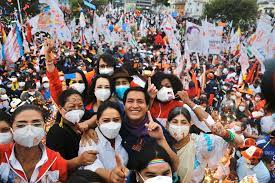

Progressive candidate Andrés Arauz leads Ecuador’s first round of presidential elections.
By Alejandra Garcia
Published in English on the site of resumen-english.org April 4.


Progressive candidate Andrés Arauz leads Ecuador’s first round of presidential elections.
Ecuador will go to the polls April 11 amid new restrictive measures imposed by outgoing President Lenin Moreno to contain the pandemic. Although the country has been mired in a health crisis for months due to the government’s mishandling of COVID-19, the ultraright-wing leader has decreed a 30-day state of emergency in the country’s eight main provinces one week before elections.
“Ecuador’s democracy is once again in danger,” warned leftist Union for Hope Alliance (UNES) candidate Andrés Arauz, who is favored to win the second round of presidential elections, according to national polls.
In a dialogue with the newspaper Pagina 12, Arauz assured that “Moreno’s decision generates a clear conflict. The state of exception prohibits the realization of mass events and implies the deployment of the National Police and the Armed Forces in the streets to ‘guarantee citizens’ calmness.’ How is it possible for us to hold elections without the measures affecting the electoral process?”
The state of emergency also restricts freedom of transit and mobility in the eight main provinces, including the capital Quito. This measure applies to the entire population, except for health workers, waste collectors, food providers and members of the emergency services sector.
Arauz, who could receive up to 37% of voting intentions ahead of his rival, banker Guillermo Lasso, alerted the world about this new attempt by Moreno to hinder Ecuador’s democratic path. “We believe the electoral process and the result can be manipulated.”
The candidate supported by former progressive president Rafael Correa (2007-2017) fears that the state of emergency will significantly reduce voter turnout at polling stations or prevent citizen mobilization in defense of their democratic rights given an electoral fraud:
“My concern is well-founded: The electoral process has been full of threats and lawfare against our candidacy. The Moreno administration has hindered the process since our candidacy registration, as it decreed the nonexistence of our party, and we were forced to ally with another political movement.”
Arauz recalled that, at the beginning of the race in June 2020, the National Electoral Council (CNE) also prevented Correa from formalizing his pre-candidacy for the vice-presidency. The political persecution against the former president, who is accused of alleged corruption crimes, “also forced us to change our electoral proposal. One year later, Moreno’s hostilities against the Arauz-Carlos Rabascall ticket continues to intensify,” he said.
When Arauz’s triumph seemed imminent according to national polls before Feb. 7, Moreno bragged about postponing the date of that first round of elections. “He could repeat the threat now amid the state of exception. I hope the CNE will act rationally and respect democracy. The Ecuadorian people will not tolerate a prolongation of Lenin Moreno’s presidential term,” Arauz said.
In the last weeks, the leftist candidate has taken his electoral campaign to the most remote places of Ecuadorian geography: the coast, the highlands and the Amazon. “I have seen with my very own eyes the desperation, anguish and pain of the Ecuadorians. There is a generalized feeling of abandonment and indignation at the government’s negligence in dealing with the pandemic and the economic crisis.”
Ecuador kicked off its vaccination campaign Jan. 21. On that day Moreno promised to place at least 4.5 million doses before the end of his administration May 24. However, only about 140,000 doses have been administered nationwide so far. Meanwhile, the country has registered over 300,000 COVID-19 cases.
Moreno could not contain the health crisis even in the first months of the pandemic. In August, images of dead bodies in the streets of Guayaquil, Ecuador’s second-largest city, portrayed how his administration was being overwhelmed by COVID-19. Health authorities were only reporting about 80,000 cases.
“Knowing firsthand the people’s anguish has made me even more committed to giving everything to restore Ecuadorian families’ dignity,” Arauz said and added that if he wins the presidency, his government will attend to the crisis, boost the vaccination process, restore the public health system and reactivate the local economy.
“We will rebuild national unity by putting Ecuador, truth, justice and reparation first,” he concluded.
Download the PDF May Day appeal to the working class Revolutionary change is urgent! Gaza…
Philadelphia On March 26, the Pennsylvania Supreme Court denied political prisoner Mumia Abu-Jamal permission to…
There are two important and overlapping holidays on April 22: Earth Day and Vladimir Lenin’s…
Twelve people were arrested April 9 for blocking traffic to Travis Air Force Base, a…
Secretary-General of Hezbollah Sheikh Naim Qassem delivered a speech on April 18, 2025. Resistance News…
Anakbayan Philadelphia held a rally on April 19 to demand the U.S. end its military…